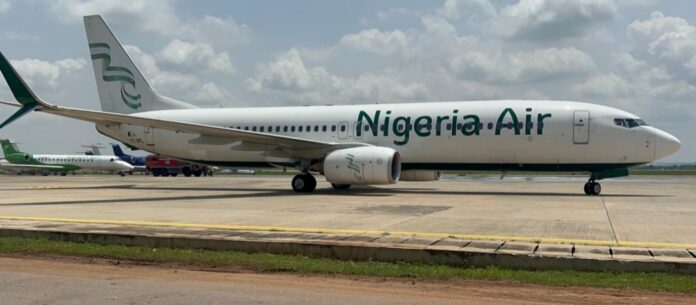Nigeria Air: FGN unveils national carrier in Abuja
The Federal Government of Nigeria (FGN) unveiled its national carrier, Nigeria Air, on Friday in the capital city.
The unveiling ceremony took place at the airline’s operation centre located in Abuja’s Nnamdi Azikiwe International Airport (NAIA).
During the event, Hadi Sirika, the Minister of Aviation, highlighted the partnership with the Ethiopian Airlines (ET) consortium, which was selected as the preferred bidder for Nigeria Air.
Sirika emphasized that this collaboration would connect the markets of both countries.
Furthermore, Sirika announced that a demonstration flight would commence soon as part of the process to fully initiate operations.
READ ALSO: Aviation minister announces arrival of Nigeria Airplane on Friday
He expressed the significance of Nigeria Air as an infrastructure that had been missing in the country’s general aviation dynamics.
He emphasized the need for an airline that matched the scale of Nigeria’s market in terms of geography and economic potential.
Sirika stated, “This Nigeria Air Limited is obviously an entity recognized under Nigerian laws and represents a partnership between Nigerian entrepreneurs and entrepreneurs in the Ethiopian Airline consortium. It has been a long journey that started in 2016 and has culminated in today’s event. Despite the challenges we faced, we persevered and are now here. We pray that Nigeria Air will be beneficial for our country, its people, its future, and humanity.”
Addressing the commencement of flight operations, Sirika explained that certain conditions set by the regulatory body, the Nigerian Civil Aviation Authority (NCAA), must be met.
He elaborated that a demonstration flight would be conducted to demonstrate the airline’s capabilities, with the duration typically ranging from 20 to 40 hours but possibly shorter, depending on the assessment.
Once the NCAA grants approval, the airline can begin operations.
Sirika also mentioned that additional aircraft would be acquired, gradually increasing the fleet size to reach 35 aircraft within the next five years.
He emphasized that the process would be gradual and that the aircraft would be acquired over time rather than all at once.
He reiterated that Nigeria Air was a privately-led airline, with the government holding only a five percent stake, and there were no plans to impede its progress.
He hinted that the government’s five percent share might eventually be made available for public sale.
The minister concluded by stating that Nigeria Air would initially focus on domestic flights and operate Boeing 737 aircraft for this purpose.
Follow the Neptune Prime channel on WhatsApp: https://whatsapp.com/channel/0029Va74ZvU2v1IqKByXoX3d
Do you have breaking news, interview request, opinion, suggestion, or want your event covered? Email us at neptuneprime2233@gmail.com


